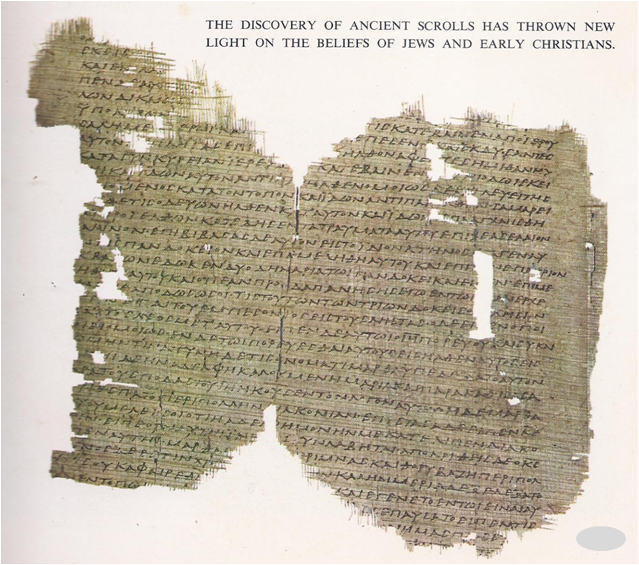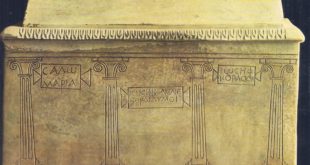ALL THAT is known about Jesus of Nazareth appears in the first four books of the New Testament. These books, written many years after his death, are called the gospels of Matthew, Mark, Luke and John. There are differences of detail in each and the events of his life are not always reported in only one or two of the books, others in all of them. The gospels of Matthew and Luke, for example, begin with the birth of Jesus to a virgin named Mary. The gospels of Mark and John begin with events that took place some thirty years later. In general, the life story of Jesus is the same in all four gospels.
Jesus was born in Bethlehem of Judea in the days of King Herod, probably about 6 B.C. Almost nothing is said of his childhood, except that he lived in a village called Nazareth in the province of Galilee with his mother Mary and her husband Joseph. Joseph was a carpenter. As a boy, Jesus probably served as his helper and became skilled in making such things as yokes for oxen, bins, chests, beds and kneading troughs.
In his home, Jesus spoke the common language of the Jews, which was Aramaic. The synagogue served both as his school and as his place of worship. There he studied the Scriptures and probably learned his prayers in the ancient Hebrew tongue. We are told that during his youth he “increased in wisdom and in stature, and in favour with God and man.”
Jesus was thirty years old when John the Baptist began preaching in the valley of the Jordan near the Dead Sea. John was believed to be a prophet. From Galilee and from all the other provinces of Palestine, people came in large numbers to hear him. Among them was Jesus and for a number of days he listened to the preachings of John. John said the Kingdom of Heaven was at hand. He told people to repent, to turn away from sinful living. He baptized those who repented and wished to start a new life in the Lord. Jesus was baptized by John in the muddy waters of the Jordan. The experience seems to have moved him deeply. He withdrew to the lonely hills above the Dead Sea. There, alone in the wilderness, he fasted and prayed for forty days and forty nights.
His public life as a religious leader began almost at once. He started preaching the Kingdom of God in Galilee, in the region around Capernaum. He traveled about, going from place to place and preaching in the local synagogues. The Kingdom of God, he said, was the kingdom of the pure in heart. God was the father of all. They were his children. Therefore, they should love God and love one another. If they were truly sorry for their sins and placed their trust in God and believed in his mercy, they would be forgiven.
As Jesus’ fame spread, many came to him with their illnesses and he healed them. He became so well known that people followed him everywhere. One day, on the shore of the Sea of Galilee, a large group crowded around him. He asked some fishermen, who were washing their nets nearby, to row him out a few feet from shore. This they did, and Jesus sat in the boat and talked to the people. When he had finished, he told Simon Peter, one of the fisherman, to row him into deep water and let down the net.
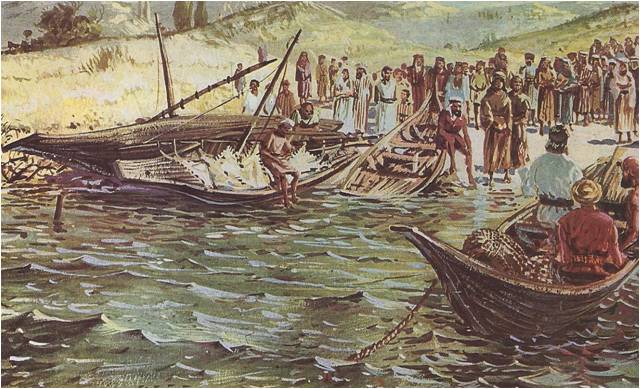
This suggestion made little sense to Peter, since he had fished all night and taken nothing, but he did as he was told. In a few seconds so many fish were trapped in the net that it broke. Simon Peter signaled his partners ashore for help. They came quickly and took up so many fish that both of the boats were filled. When they reached shore, Simon Peter and his partners James and John left their boats and fish to follow Jesus, who promised to make them fishers of men. According to the Gospel of Luke, they were the first of his disciples.
Some people refused to believe in the miracles, as Jesus discovered when he returned home to Nazareth. There people thought of him still as the son of Joseph the carpenter. When it came his turn to read from the Scriptures in the synagogue, Jesus read aloud a passage from Isaiah:
“The Spirit of the Lord is upon me, because he has anointed me to preach good news to the poor . . ”
Turning to the people, Jesus said, “Today this scripture has been fulfilled in your hearing.”
They were shocked. They had seen Jesus grow into manhood, just an ordinary human being like themselves. Now he was trying to make them believe that he was the Lord’s Anointed! Why didn’t he prove it with miracles if he wanted them to believe? Jesus hinted that they would see no miracles in Nazareth because of their lack of faith.
That was too much. They rose up in anger and took him to the brow of a hill above the village to throw him over a cliff, but somehow he managed to escape.
He returned to Capernaum and taught in the synagogue there on the Sabbath days. People were amazed at his teachings. They were used to hearing the scribes and the Pharisees discuss the fine points of the laws of Moses. The scribes and the Pharisees were leaders in the synagogues. The scribes were experts in the Law. They served as teachers, explaining the Law to the people. The most learned of them were called doctors of the Law to indicate that they were scribes of great knowledge and authority. Many scribes belonged to a strict religious sect called the Pharisees. Its members tried to live pure lives under the Law and to set an example for others to follow. The scribes and the Pharisees enjoyed talking about the meaning of words and they liked to compare different passages in the Scriptures. For the simple folk of the villages such discussions were very dry and difficult to understand.
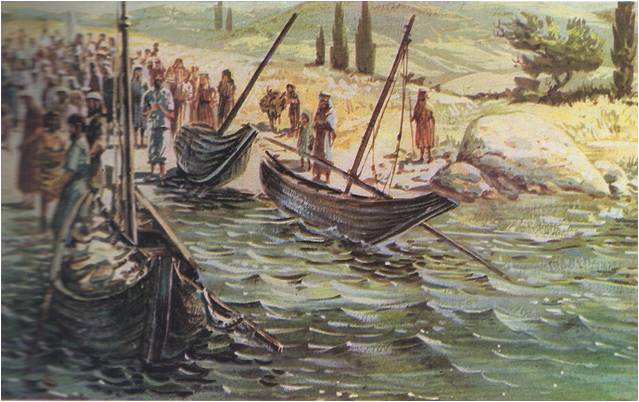
Jesus spoke to them in the everyday language of the people. He talked about the simple laws of the Heavenly Father. He explained what he meant by telling stories about fishermen, farmers, lost sheep, wayward sons, the planting of seeds and many other familiar things that were part of their daily lives. Even the children could understand him. There was something about his manner of speaking, too, that was different. He did not sound like a teacher. He spoke as one who had higher authority.
His disciples rapidly increased in number. To become a disciple a man had to sacrifice all that was his. He had to leave home and family, give up all his possessions and follow Jesus with no thought of his earthly needs. From then on, he had no home. He led a wandering existence, following Jesus from place to place. Sometimes the disciples stayed in the homes of friends. More often they slept under the olive and sycamore trees, wrapped in their woolen cloaks. They ate what was given them, usually bread, dates, raisins, honey and sometimes cheese. When they were near a lake they would eat fish, if they had time to catch them.
Jesus often used his disciples to handle the great crowds that came to hear him. People came from Jerusalem and from all Judea and from the seacoast of Tyre and Sidon, and from the region beyond the Jordan. One day, seeing the great multitudes that followed him, Jesus led them up onto a mountain. He seated them on the slope and began to teach them, saying:
“Blessed are the poor in spirit, for theirs is the
kingdom of heaven.
Blessed are those who mourn‚ for they
shall be comforted.
Blessed are the meek, for they shall inherit
the earth.
Blessed are those who hunger and thirst for
righteousness, for they shall be satisfied.
Blessed are the merciful, for they shall obtain
mercy.
Blessed are the pure in heart, for they shall
see God.
Blessed are the peacemakers, for they shall
be called sons of God.
Blessed are those who are persevered for
righteousness’ sake, for theirs is the kingdom of heaven.”
Jesus said he had not come to set aside their religion and start another. He had not come to destroy the sacred writings of the Law and the Prophets. He had come, rather, to fulfill the Law and the Prophets and to bring them to perfection.

The people had been taught the ancient saying, “An eye for an eye and a tooth for a tooth.” Jesus told them vengeance was wrong. He told them not to resist the wrongful acts of others. If someone struck them on the right check, they were to turn the other also. They had been taught, “Thou shalt love thy neighbour and hate thine enemy.” Jesus said they should not hate. He told them to love their enemies and to repay evil with good.
He told them not to lay up treasures on earth, but rather to lay up treasures in heaven, “For where your treasure is, there will your heart be also.” No man could serve two masters. He had to make a choice between material things on earth and the Kingdom of Heaven.
Jesus told them to be merciful. Judge not and you shall not be judged. Condemn not and you shall not be condemned. Forgive and you shall be forgiven. Give and you shall be given in return in good measure. All things that you would like to have others do unto you, do you also unto them. Place your trust in God, he told them. Have faith. “Ask, and it will be given you; seek and you will find; knock and it will be opened to you. . . .”
The sermon Jesus made on the mountain summed up much that he had been teaching in the synagogues. People were astonished at his teachings, but many were disappointed. They had come hoping to find the leader God had promised them, a king who would lead them against the Romans. Instead, Jesus had spoken against hate and vengeance.
Out of his large group of disciples Jesus chose twelve to be his special assistants. These he called his apostles. They were Simon Peter; Andrew; James and his brother John; Philip; Bartholomew, who was also known as Nathanael; Thomas; James, son of Alpheus, who was called James “the less” because he was younger than the other James; Matthew the publican, the word publican meaning a public official who collected taxes for Rome; Simon the Zealot; Jude, also known as Thaddeus; and Judas Iscariot.
These were all simple men of great faith. All were Galileans, except for Judas Iscariot, who was from Judea. He probably had some education, for he was chosen as the treasurer of the group. Simon Peter, an outspoken man who believed in action, usually acted as their leader.
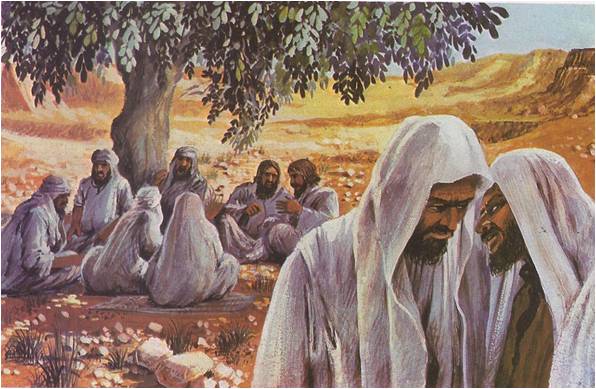
One day Jesus asked his disciples who people said he was. They answered that some thought him to be John the Baptist, some Elijah, or one of the other prophets.
“But who – do you say that I am?” asked Jesus.
As usual, it was Simon Peter who answered him. “You are the Christ, the Son of the living God.” “Christ” was a Greek word that meant Messiah, the Anointed One.
Jesus said, “Blessed are you. . . for flesh and blood has not revealed this to you, but my Father who is in heaven. I tell you, you are Peter and on this rock I will build my church . ..”
He began to prepare them for what was to come, foretelling his death in Jerusalem and said he would rise again on the third day. They heard him, but did not understand.
When Jesus had trained the apostles he sent them out by twos to preach the Kingdom of God. They took nothing with them, trusting that God would provide for their needs. The mission did not last long, but it gave them experience. They returned filled with wonder at the miracles they had been able to perform.
Jesus reminded them frequently of the importance of faith. If they had faith, he told them, all things would be possible for them. They could say to a mountain, move and it would move. The test of faith was a difficult one for his apostles. Even Peter’s faith failed him time and again.
It failed him one night as he and the others were rowing across the Sea of Galilee. Suddenly, in the dim starlight, they saw the figure of a man walking toward them across the water. Believing it to be a spirit they cried out in fear. Jesus identified himself and told them not to be afraid.
Peter shouted back, “Lord, if it is you, bid me come to you on the water.”
Jesus said, “Come.”
Climbing out of the boat Peter began walking on the water. When he felt it moving under his feet he became frightened and began to sink. “Lord, save me,” he cried.
Jesus caught his hand and helped him back into the boat. “O man of little faith,” he said, “why did you doubt?”
Doubt was usually removed by miracles, but not always. Some of the miracles of Jesus actually created doubt in the minds of the people and caused many of his early followers to turn away from him.
In the village of Cana, he healed the dying son of a Roman officer. Later, he cured the servant of another Roman in Capernaum. He also cured the daughter of a Canaanite woman. None of these people believed in the true God and they were therefore looked down upon by the Jews. The Romans, of course, were the hated enemy. Any Jew who helped a Roman was surely a traitor to his people.
The Jews were proud of being the Chosen People of God, but Jesus asked them to believe all men were God’s children. That was like saying that the Chosen People were no better than others. It seemed like an insult that struck at the very heart of their pride as a people.
The Pharisees were quick to point this out. They were angered by the way Jesus and his disciples calmly disregarded many of the rules which they themselves held sacred.
LAWS AND RULES
Over the centuries, the Pharisees had worked out a complicated set of rules based on their interpretation of the Laws of Moses. The Pharisees had begun making such rules because they were alarmed at the way Jews were mingling with other peoples who did not believe in the true God. These nonbelievers, called pagans, worshiped many false gods. They looked down upon the Jews, because the Jews had only one God, but where Jews and pagans lived side by side, they became friendly. Many Jews became careless about their religion. Some even married pagans and gave up their Jewish religion. It was to keep the Jews together as a people and to strengthen their faith that the Pharisees started making rules. One of these rules forbade Jews from mingling with pagans. Other rules were made to help uneducated Jews live good religious lives under the Laws of Moses. The trouble was that the Pharisees continued making rules year after year. They made far too many rules and most of the Jews began to complain, for their religious duties had become a burden to them and took too much of their time.
THE GOOD SAMARITAN
The Sadducees, another Jewish sect, were strongly opposed to the Pharisees and their rules. The Sadducees were well-established Jews who thought more of their pride and comfort than they did of religion. They were willing to associate with pagans when they could profit by it and refused to have anything to do with the rules of the Pharisees.
Jesus had nothing in common with the Sadducees. He was closer to the Pharisees in his thinking; he too believed the Law was sacred. When he criticized the Pharisees, as he often did, it was because he felt that they followed the letter rather than the spirit of the Law.
For this reason, Jesus ignored many of the rules of the Pharisees. They fasted regularly on Mondays and Thursdays. Jesus did not. He ate in the homes of tax collectors, who were regarded as sinners and even chose one of them, Matthew, as an apostle. The Pharisees were shocked. They believed that such people were unclean and that all good Jews should avoid even the slightest contact with them.
The most honoured of all the rules of the Pharisees had to do with the keeping of the Sabbath. No one was allowed to work on the Sabbath, or even pluck fruit from a tree. So the Pharisees were greatly upset when they heard that the disciples of Jesus had picked grain heads and eaten the kernels on the Sabbath as they walked through the fields. What was worse, Jesus healed a number of people on the Sabbath. On one of his early visits to Jerusalem, he had made clay on the Sabbath and used it on the eyes of a blind man to restore his sight. Making clay on the Sabbath was strictly forbidden. This proved to the Pharisees that Jesus was a sinner. Any man who made clay on the Sabbath could not have been sent by God. From that time on they had him watched constantly, hoping to find something they could use against him.
Jesus felt that the Jews did not understand the full meaning of the Second Commandment, that you should love your neighbor as yourself.
“And who is my neighbour?” asked a Pharisee.
Instead of answering him directly Jesus told him a little story, or parable, to illustrate his point. It was common in those days for people to tell parables when they were trying to explain something and Jesus was particularly good at it. There was once a man, he said, who was attacked by thieves and left half dead by the side of the road. A priest came that way and passed by the wounded man. Next came a Levite, who assisted the priests in the Temple. He, too, saw the man and passed him by. Then came a man from the province of Samaria. He took pity on the man, carried him to an inn and took care of him.
“Which of these three,” asked Jesus, “do you think, proved neighbour to the man who fell among the robbers?”
The question was not an easy one, for Jews looked upon Samaritans as being even lower than animals. How could such a one be a neighbour?
The Pharisee saw the point and answered, “The one who showed mercy on him.”
Jesus said, “Go and do likewise.”
During the last months of his life Jesus preached mainly in Judea, in the region around Jerusalem. He was in the city in October for the Feast of Tabernacles and again in December for the ceremony of Dedication. On both occasions he carried out his religious duties as one of the Jewish faith.
THE LIGHT OF THE WORLD
The teachings of Jesus were based on his Jewish faith and on the Scriptures. He frequently referred to the Scriptures when he spoke to the people. What he had to say about the golden rule and love was based on the teachings of rabbis like Hillel and on passages in the Scriptures. These passages were overlooked by many Jews in their strong desire to set themselves apart as the Chosen People.

One day when Jesus was in Judea, a disciple asked him how to pray. Jesus taught him this prayer:
“Our Father who art in heaven, Hallowed be thy name. Thy kingdom come, Thy will be done, on earth as it is in heaven. Give us this day our daily bread, And forgive us our debts, as we also have forgiven our debtors; and lead us not into temptation, but deliver us from evil.”
Jesus described himself in many ways. He said, “I am the bread of life; he who comes to me shall not hunger and he who believes in me shall never thirst.”
At another time he said, “I am the light of the world; he who follows me will not walk in darkness, but will have the light of life.” The Jews knew what “the light” meant. It was one of the phrases used in the Scriptures to describe the Messiah.
The Jews argued among themselves about these sayings. Some said, “He has a demon.” Others said, “Can a demon open the eyes of the blind?”
They found Jesus walking in the Temple one day and demanded a straight answer: “If you are the Christ, tell us plainly.”
Jesus answered, “I told you and you do not believe. The works that I do in my Father’s name, they bear witness to me . . .”
To the Jews this was blasphemy, a sin against God. They tried to arrest him but he slipped away and fled to the land beyond the Jordan.
He returned again to Judea when he heard that his friend Lazarus lay ill in Bethany. That village was only an hour’s walk from Jerusalem. Jesus had often stayed there as a guest in the home of Lazarus and his Sisters. By the time Jesus and his disciples arrived, Lazarus was dead and had been in his grave four days. Jesus had the stone rolled from the entrance of the grave and brought the dead man back to life.
It was one of his last miracles and it caused such excitement in Jerusalem that the chief priests and Pharisees met to search for a way to “put him to death.” Many doubted that he would dare appear for the Passover. They watched for him, thinking he might slip quietly into the city.
Then on the Sunday before Passover they were amazed to see him ride boldly into the city, leading a great multitude. During the days that followed, Jesus taught daily in the Temple. The Pharisees feared that this would cause trouble with the Romans. They dared not arrest him, for he had won many supporters. They tried, instead, to trap him with questions.
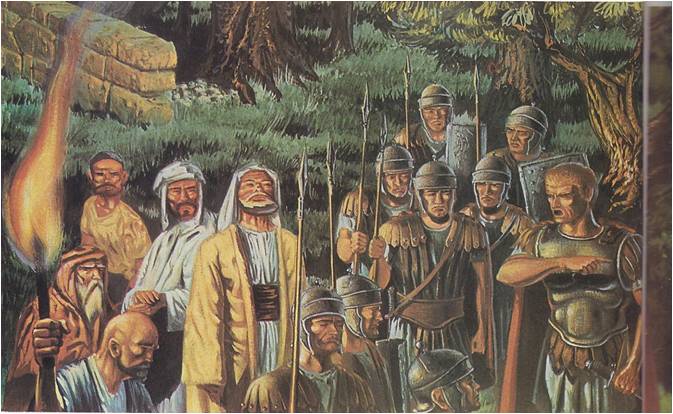
“Is it lawful for us to give tribute to Caesar, or not?” they asked. Jesus knew he would lose the respect of many Jews if he approved the hated Roman tax. If he said the tax was unlawful, he would be reported to the Romans, who would then arrest him. He asked whose image was on the coin.
“Caesar’s,” they answered.
Jesus said, “Then render to Caesar the things that are Caesar’s and to God the things that are God’s.”
They tried him with other questions, too, but could find no fault with his answers.
Now Judas Iscariot, one of the apostles, went secretly to the chief priests and offered to lead them to Jesus at a time when people were not about, so that he could be arrested quietly. The chief priests were pleased and agreed to pay him thirty pieces of silver.
On the Thursday before Passover, at sundown, Jesus and his apostles met in a large upper room of a house in the city and shared the feast of unleavened bread. Why the feast was eaten on Thursday instead of Friday is not known. There is a tradition that the Galileans and some others observed the feast a day early when Passover occurred on the Sabbath.

Jesus took bread, broke it and gave it to the apostles, saying, “Take; this is my body.”
Then he gave them wine, saying, “This is my blood of the covenant, which is poured out for many.”
Once again he foretold his death. One of them, he said, would betray him. He promised that God would send them a comforter, the Holy Spirit.
After praying, they left the city and went to an olive grove called Gethsemane on the Mount of Olives. They had spent other nights there.
Judas Iscariot knew the place well. He came during the night with a party of Temple servants and soldiers, who arrested Jesus and took him to the house of the high priest. There the priests held a hearing and heard witnesses against him. Finally the high priest asked him, “Are you the Christ, the Son of the Blessed?”
Jesus answered, “I am; and you will see the Son of man sitting at the right hand of Power and coming with the clouds of heaven.”
The high priest said to the others, “You have heard his blasphemy. What is your decision?”
They agreed that Jesus was guilty and that he should die. They decided to take him before the Roman governor, who alone had power to pass the death sentence.
When Judas Iscariot heard that Jesus had been condemned by the council of elders he had a change of heart. He tried to return the thirty pieces of silver, but the priests refused it. In despair, Judas threw away the blood money and went out and hanged himself.
The chief priests brought Jesus to Pontius Pilate and said, “We found this man perverting our nation, forbidding to give tribute to Caesar and saying that he himself is Christ a king.”
Pilate questioned him. When he learned that Jesus was from Galilee he sent him to Herod, the ruler of Galilee, who was also in the city at that time, but Herod made fun of Jesus and sent him back to Pilate dressed in a robe so that he looked like a king.
DEATH ON THE CROSS
There was a tradition that the Roman governor should release a prisoner to the people at the time of the Passover. Pilate asked, “Whom do you want me to release for you? Barabbas or Jesus who is called Christ?”
Barabbas was a well-known robber, but the priests instructed the people to call his name. So they cried for Barabbas and demanded that Jesus be crucified. They said, “If you release this man, you are not Caesar’s friend; everyone who makes himself a king sets himself against Caesar?
The argument disturbed Pilate. He did not want to do anything which might lead to misunderstanding between himself and Caesar. It could be a difficult charge to answer. “Shall l crucify your king?” he asked.
The chief priests answered, “We have no king but Caesar.”
Pilate gave in. He had Jesus flogged and turned over to the soldiers to be crucified. The soldiers placed a crown of thorns on Jesus’ head to mock him and led him beyond the walls of the city to a hill called Golgotha, which means “the place of the Skull.” There he was crucified between two thieves.
Those who passed that way taunted him. “If you are the Son of God,” they said, “come down from the cross.”
Many said, “He saved others; let him save himself, if he is the Christ of God, his Chosen One!”
About the ninth hour Jesus cried in a loud voice, “My God, my God, why hast thou forsaken me?”
One of those who stood nearby ran and filled a sponge with vinegar and placing it on a reed, gave him a drink. A few minutes later Jesus cried out in a loud voice and gave up the ghost.
So it was that death came on the cross to the man who was to have such a great influence on world history.
